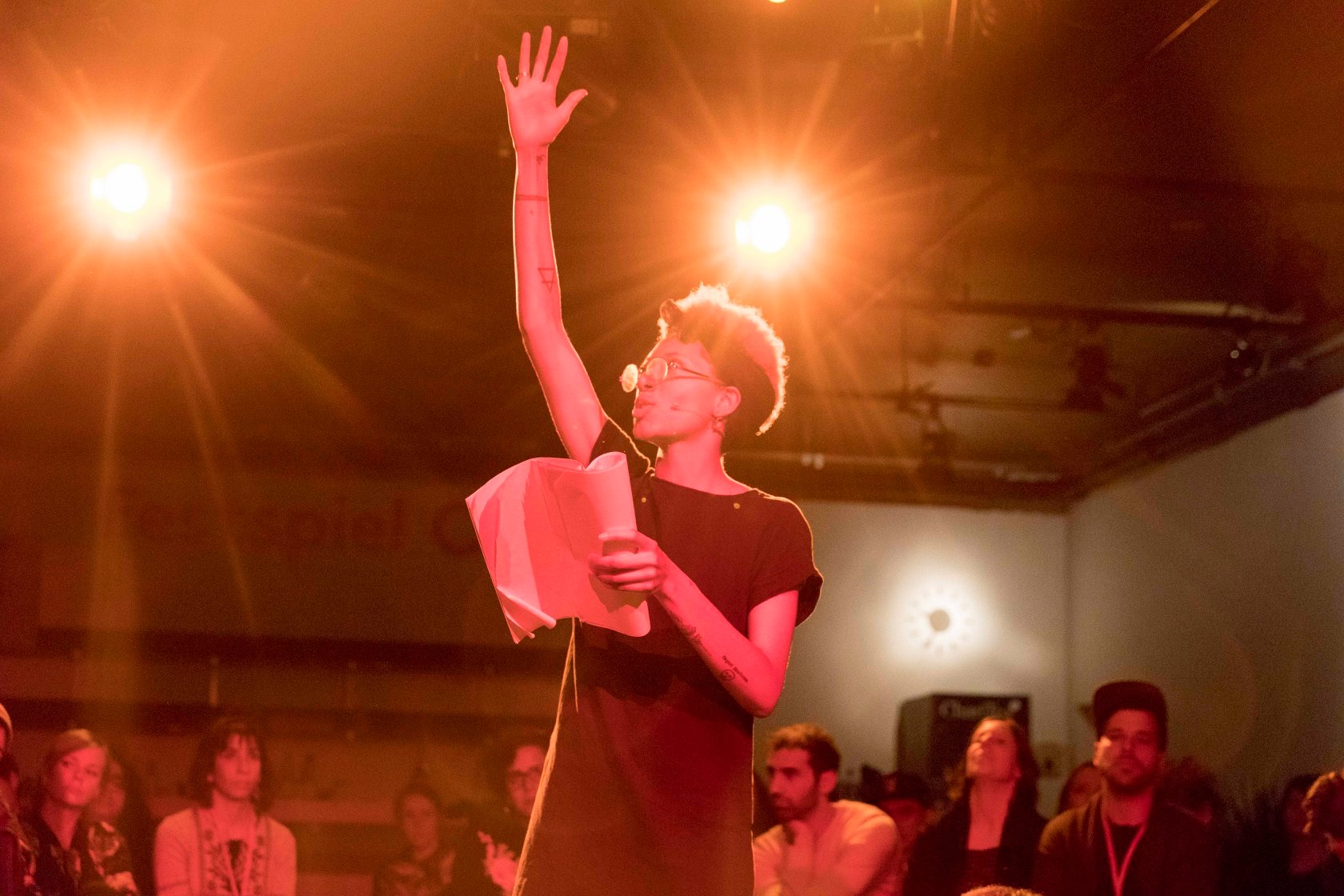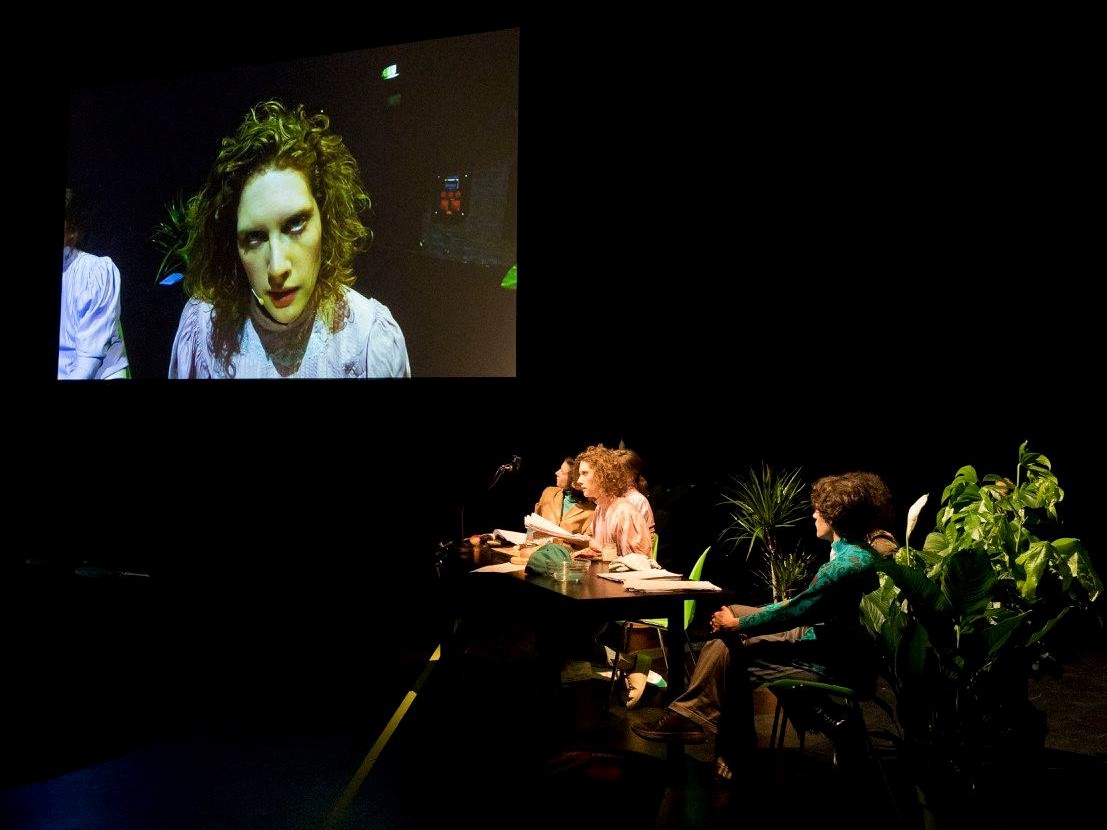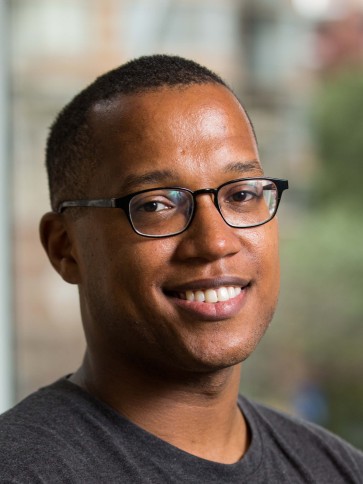Branden Jacobs-Jenkins is making waves in the USA. The 34-year-old playwright already has an Obie Award under his belt and has twice been a finalist for the Pulitzer Prize in drama with his plays Gloria and Everybody. We found a quiet moment amidst the hustle and bustle of this year’s Theatertreffen to talk with the Stückemarkt jury member about the boom in young dramatists, the new golden age of black playwriting and the culture industry of American theatre.
TT-Blog: Branden Jacobs-Jenkins, this year’s Stückemarkt has a post-protest focus, spanning black utopias, feminist dystopias and (post-)migrant perspectives. Are the selections picking up the political slack left by the main festival’s invitees?
Branden Jacobs-Jenkins: That’s probably a question for Maria Nübling, who chose this year’s theme. I believe she wanted works that somehow projected into the future and provided theses about the present state of affairs as opposed to complaints. But I do think the purpose of the Stückemarkt is to provide a snapshot of what an up-and-coming generation of artists are concerned with or thinking about on an international scale.
And what are they thinking about?
There is a perennial agitation or anxiety about self-identification, identity and how to feel empowered in your difference. That united many of the submissions and everyone seems to be searching for new modes of expression with regards to that question. With Gracie Gardner’s Pussy Sludge, you’re seeing someone trying to build a new vocabulary of images and affect to think through feminist subjecthood on stage. In Nazareth Hassan’s piece Vantablack, you’re looking at a mind firing on overdrive trying to solve this problem of creating a safe space for blackness inside of a historically “white” form.
Vantablack and Pussy Sludge – the two US-American productions invited to this year’s Stückemarkt – resonate with strong social movements such as #BlackLivesMatter and #MeToo. Have these waves of activism inspired a new generation of artists?
They’re all indicative of a general zeitgeist or moment in which women and people of colour are simply asking questions about the status quo as they themselves gain economic footholds and generational meaning. Gracie’s play has actually been around for a couple of years and was definitely on the map before Harvey Weinstein was taken down. These artists are less products of political movements than they are actually working adjacent to historical moments where social anxieties and concerns are bubbling to the surface. Theatre has historically always been a space where the civic, social body can re-examine its values and they’re writing within this tradition.

It sounds like there’s a boom in young, politicised playwrights in the USA…
If you read the papers, they would tell you that, but most of us writers would say we’ve been around for a while – it’s only now that people seem to care! And I don’t want to reduce these artists to small pawns on a chessboard of identity politics, but there have been a number of very strong and significant contributions by young women to theatre in the States recently. One of them is Claire Barron, whose Dance Nation recently swept up a ton of awards, another is Jackie Sibblies Drury, one of the first ten women to ever win the Pulitzer Prize for drama. So there’s definitely a wave of smart, interesting, form-busting, young female playwrights at the moment. And, concurrently, the New York Times recently dedicated a whole section to a “new golden age of black playwriting”. In a way, Nazareth is benefiting from a critical energy that already exists. When there’s more writing, there are more ideas, information and growth in the scene.
Is this lack of black tradition in German playwriting a stumbling block for a theatre that can critically deal with race?
In the States, we have a longer tradition of this work that stretches as far back into the 20th century as you probably dare to go. As an artist now, who self-identifies as black and has written about themes of representation and anti-blackness, I feel as if there is a sense of coherence I’m afforded because I can cite artists like Lorraine Hansberry, James Baldwin, Adrienne Kennedy, Suzan-Lori Parks, Tracy Scott Wilson, Robert O’Hara and Lynn Nottage as forebears – people who have encouraged a more sophisticated, nuanced lens through which American audiences can witness my work. I don’t know if there has been any black German playwright ever, so wrestling with ideas of representation becomes difficult. I see in both Nazareth and Gracie’s work the influence of a constellation of American artists going as far back as the 1960s. They’re carrying on an old American tradition of inquiry into identity and identification.
You’ve previously criticised the way in which German theatre deals with race – mostly through inauthentic exoticism and clumsy “othering”. Is German theatre simply too white?
Things have changed some from when I lived here a few years ago. But I think the problems of representation here are structural. I definitely think that there is either a resistance or inability to articulate the problem here and so it is allowed to persist, more or less unchallenged, because if you can’t name it, you can’t change it. Just yesterday, I was having a meeting about how my work does or doesn’t translate in Germany. A common hesitation about my work is that it’s “too American”, which seems to be code for their not having a diverse enough ensemble to pull it off.
Do we need a quota for people of colour in theatre then?
Maybe – but who are these people? If you don’t have black actors or directors, it’s because they’re not going to acting or directing school. People counter that they can’t force “these people” to go to school, but it’s creating a feedback loop where there’s no reason for them to want to become actors or directors in the first place. To radically change the status quo, you have to make structural interventions, even if they’re only temporary – and you need to invest in the success of those interventions. People like to say that the cream rises to the top. I say if you’re not milking the cow, you aren’t getting any cream. And as controversial as this female quota is, I think it’s an important message. If a couple of midlist guys don’t get invited to the Theatertreffen for two years, they’ll be ok.
What’s behind the current wave of young writers in the USA then?
For almost all of the 00s, there was a significant amount of funding poured into the cultivation of young dramatic writers. I’ll confess that I am a direct beneficiary of this and Grace and Nazareth probably are too. It’s actually very easy to be an emerging writer in America right now because there are tons of awards, fellowships and residencies available. It becomes harder after that, once you’re two productions in.

From a European perspective at least, theatre in the USA comes across as a commercial endeavour with a make-or-break philosophy, with state-funded theatres basically non-existent. How true is this?
Broadway is obviously what most people think of when they think of American theatre and it is definitely the most significant commercial avenue of theatre-making in the States. But with Ivo van Hove and half of the British theatre industry turning up every season, it also feels like the centre of some sort of globalised theatre world. We don’t have a state-funded model, which was more or less killed in the cultural wars of the 80s and 90s, but we do have non-profit models which in theory support the art “for art’s sake” as opposed to commercial gain. In practice, however, there’s been a distinctly neoliberal muddying of that distinction recently, with commercial interests using non-profits to “try out” or “develop” things like Hamilton.
Does commercial viability impact artistic freedom?
Any strength or sense of artistic freedom in contemporary American theatre is a direct result of the 1960s, when theatre artists like Edward Albee, Sam Shepard and Maria Irene Fornes re-laid the tracks of the American theatre tradition and created the “downtown” or “off-off-Broadway” movement – essentially a self-sustained community of artists predominantly in New York, who were able to make a lot of work on very little throughout the 60s, 70s, and 80s. These people exerted a huge influence on playwriting and how it is taught and thought about. Their resourcefulness and ideas of material precarity are ingrained in most artists working in the States to this day. None of us hold out much hope for a Broadway budget, so we all write more or less whatever we want on whatever scale seems available to us.
Coming from such a theatre background, what has stood out to you the most from Theatertreffen’s selections so far?
I feel bad because I haven’t actually seen that many of the shows yet, just Hotel Strindberg, but I’m excited about Thom Luz’s Girl from the Fog Machine Factory and also Sebastian Hartmann – people keep telling me he’s a director that’s up to something I’ve probably never seen. And of course She She Pop.
As a blogger team, we were fairly unanimous in finding Hotel Strindberg misogynist, whereas we perceived older generations of theatregoers celebrating it as a post-#MeToo play, much to our surprise, which left us with the sense that criticism of the play takes on a generational form. What did you think?
It’s so shady to talk about other writers but Simon Stone came to the States with Yerma and a similar conversation was had amongst older and younger theatre-makers. Yerma somewhat cleverly tried to translate that story into a context of gentrification and IVF treatment but what I felt was one of the key and scariest elements of the original play was how well Lorca depicted the pressures of a specifically conservative and religious society on a woman’s body – which is actually a burning world issue at the moment. So it felt like a missed opportunity. Similarly, with Hotel Strindberg, I’m not sure if the piece gets – or even cares really – what Strindberg might have been writing about. Stone strips all the original works of any socio-historical pretext and so it becomes a bit of a tempest in a teapot. It’s a glossily packaged presentation of semi-angsty bourgeois life, a neoliberal, late-capitalist existence that to me lacks spirit. It didn’t quite make the case for why I should care about some dead angry Swede who was in pain his whole life. But maybe that’s just my taste.
